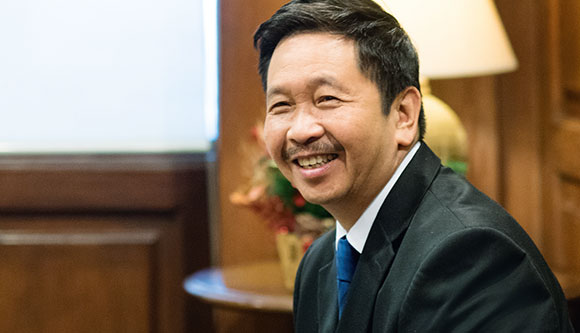MoneySense Q2 2021 Features The Faustos, The First Family of Finance
How the Faustos live a lifestyle of sound financial behavior and promote their advocacy for financial literacy
By Excel V. Dyquiangco
Get your digital copy of MoneySense Q2 2021 Issue now!
The First Family of Finance
The Faustos are out on a mission. For over a decade, Marvin and Rose Fausto—together with their sons Martin, Enrique, and Anton—have been at the forefront of promoting financial literacy to Filipino families.
They conduct their Family FQ Workshops across the country, where they teach families about aligning money with their goals and values. Marvin, a pioneer and leading figure in fund management, has for decades been promoting investing in the Philippines. Rose, through her website, books, newspaper columns, TV interviews, and social media accounts, has been teaching personal finance and behavioral economics under her FQ Mom platform. And she, along with her sons, share money advice to the younger generation through her podcast and Kumu videos.
If there is a First Family of Finance, the Faustos would be it.
“We have different organizations inviting us to do these workshops—sometimes just me and our sons, or Rose and our sons, or just me and Rose,” Marvin shares. Given that the couple’s career is in finance and investments, their credibility is already built in.
Marvin, for instance, has worked in financial services for over three decades, managing some of the country’s biggest funds. He was the Chief Investment Officer of BDO, the founding president of the Fund Managers Association of the Philippines, and currently the President of COL Investment Management. “I helped out in putting up this fund supermarket to make investing for everyone,” he shares.
Rose also has had a long career in corporate finance and investment banking. She began as a credit analyst at Far East Bank & Trust Co., then switched to corporate finance at some of the leading investment firms in the country, such as FEB Investments, Inc. and All Asia Capital & Trust Co., where she served as Assistant Vice President. She also worked as a financial consultant for five years for a USAID project on renewable energy.
While it is one thing to talk credibly about finance and investing, it is another thing teaching about family finances and teaching children about money. The proof, as they say, is in the pudding. And the Faustos have for decades been practicing what they preach. “We can show that our children grew up knowledgeable in personal finance and having the right financial behavior,” Marvin notes.
Editorial:
Family Inc.
Any organization—charity, church, country—can be run like a business. A family is the smallest unit of organization. So, you can run your household just like a business. Here are some ways you can do this:
Craft a mission statement.
An organization must have a purpose for why it exists. Your family is not there by accident. How can your family be a force for good? What are the common values you share and aspire to? Write a one-line mission statement along with a list of core values. In our case, we use this Bible verse as our mission statement: “To grow in wisdom and stature, and in favor with God and man.” Get everyone involved and inspired!
Set goals.
If you want to get things done in your family, set clear and achievable goals. And it is not just stuff like chores or grades. You should include character traits you want to be developed. Write them down. As much as we can, we zero in on one character trait at a time that we all need to work on. We talk about what we need to do for the week and then later report what we did to make it happen.
Divide your roles.
Be specific about your responsibilities. The father can be the Chairman or CEO, setting the direction, overseeing the family, and ultimately be held responsible. The mother can be the COO, executing the day-to-day household work and family goals. Similarly, the husband can be the CIO handling investments while the wife can be the CFO managing the budget.
Introduce systems.
To run your household like clockwork, create systems for doing everything, from creating the menu to cleaning the house. Use checklists, flowcharts, and schedules that are easy to follow. You print these out and you just make it clear to everyone what needs to be done and what has been achieved for each day or week.
Hold meetings.
Make sure everyone is on the same page by having family meetings. It can be weekly or monthly. Or it can be on an as-need basis. This is where you bring up plans, discuss areas of improvement, and report on progress.
Delegate tasks.
Everyone needs to contribute to the household’s daily operations. Even if the husband is the sole breadwinner, he should do his share of chores. And even if you have house help, your kids should have daily chores as well.
Outsource some work.
Having an army of helpers, cooks, and drivers doing everything for you can be self-defeating. Even if you have help, it is important that everyone in your family still do chores. Even Bill Gates washes the dishes every night! But things that may be too time-consuming or requires skilled experience like deep-cleaning, plumbing, or auto-detailing can be outsourced.
Give incentives.
Not all chores or work should be tied to rewards. Your main responsibilities are your contribution as a member of your family. You do not get paid for those. But extra chores and initiatives can be rewarded. Incentives can be money, extra gadget time, a chore break, or anything that is meaningful to that person being rewarded.
Celebrate wins.
While you do not work for a good grade, job promotion, or a cleaned-out garage just to get a reward or recognition, you should celebrate these wins. Of course, you want excellence and achievements to be intrinsic values. But extrinsic rewards can serve as bonuses for a job well done. In our case, we usually order a feast of special food to celebrate.
Keep to your budget.
Allocate your resources to spending, saving, investing, and giving categories. And stick to your budget. Update your financial plan at least once a year and discuss it with your family. And if you need to cut back, get everyone to participate. For example, when we prepare for a big vacation, we all agree to cut some expenses for the month leading to our holiday.
Maximize returns.
Make sure you are cash flow positive and use your surplus properly. Set aside a fund for family emergencies and get insurance for possible catastrophic losses. And invest for long-term goals like retirement and education.
Think like a shareholder.
Remind everyone that you are all in this family together. Yes, you all enjoy the rewards of great vacations, gadgets, and good food. But you all also share in the responsibilities of doing chores, sticking to the budget, and performing well. Think like an owner, not an employee. We always remind our children: You do these things not because you are told to but because that is your contribution to the family. You have a stake in your family’s success.

Heinz Bulos
Editor-in-Chief







